Released updated PyCharm 3.1 with support for Python 3.4 and Django 1.6: what has become better?
We want to share the joy: we just released PyCharm 3.1. This is a minor release of PyCharm, albeit a minor one, but still filled with new functionality. As you know, PyCharm since version 3.0 is available in both the paid version of PyCharm Professional Edition and the free open source PyCharm Community Edition.
Download PyCharm 3.1 right now (and keep reading until it loads).
New PyCharm 3.1 now supports the latest versions of Python 3.4 and Django 1.6. We did not ignore the support of Google App Engine - it has been noticeably improved. PyCharm 3.1 also integrates improvements made recently in a common platform for all our IDEs - IntelliJ.
')
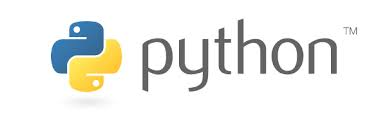
PyCharm 3.1 supports Python 3.4, including new standard libraries and the latest language innovations. You can safely switch to a new interpreter and work while enjoying new Python features.

In PyCharm 3.1, there are no more problems that could have previously arisen when working with the new version of Django, so now you can safely update both PyCharm and Django!
The details on how to create and upload your application on Google App Engine are shown in a screencast of John Lindquist:
Among the innovations worth noting: in PyCharm 3.1, the project launch configuration settings for the Google App Engine and Django project types are unified, and the Google App Engine integration itself now works perfectly with username and password authentication. In addition, we added several inspections, thanks to which code analysis and auto-completion were improved.
After the release of PyCharm 3.0, we are closely engaged in improving performance and optimizing the new version. In version 3.1, we accelerated editing of large .po files, as well as indexing and searching for heavy binary modules like PyGTK and PyQT. We expect that in the next release we will accelerate even more features. Stay tuned!
Since PyCharm 3.1 is based on the latest version of the InelliJ platform, it incorporates all the latest improvements to the platform, for example:
By default, PyCharm hides the toolbars, leaving only the menu and editor (it is easy to put them in place - View | Toolbar and View | Tool Buttons). The toolbar can also be seen by clicking the special small icon in the lower left corner of the screen).
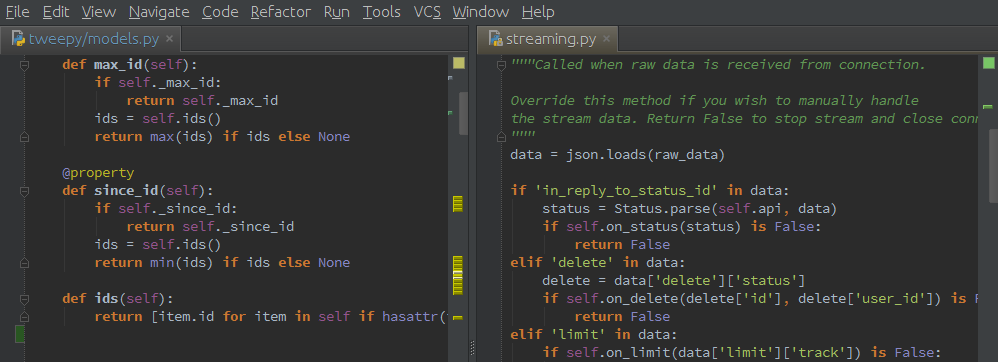
When you hover on the error highlighting, warning, or selecting a region on the scroll bar, a pop-up window appears with the corresponding code fragment, as well as the warning itself or an error message.
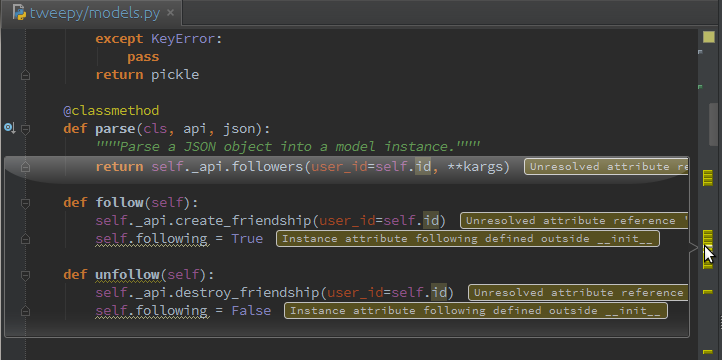
You use convenient navigation with the help of Go to Declaration, Navigate to Class / File / Symbol, Find Action functions? Now everything is even better - you can search and navigate everywhere even faster, and even uniformly.
A quick double-click Shift calls up the new Search Everywhere function, allowing you to quickly find a class, file, action, or even an IDE setting.
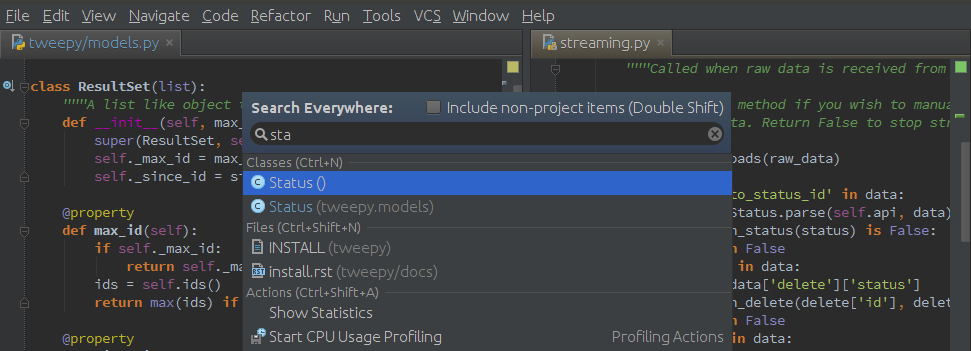
Now it is even easier to search for files and directories in the project: in the window with the project tree just type a substring and the corresponding names will be highlighted.
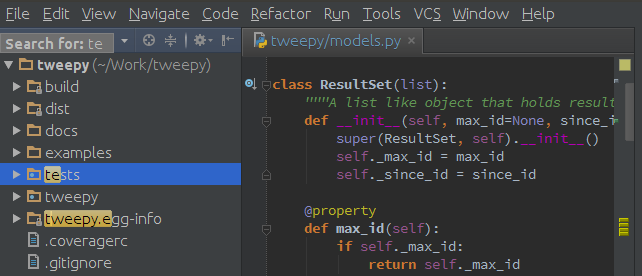
To go to the directory, you can use the same mechanism as to go to the file: Navigate to File.
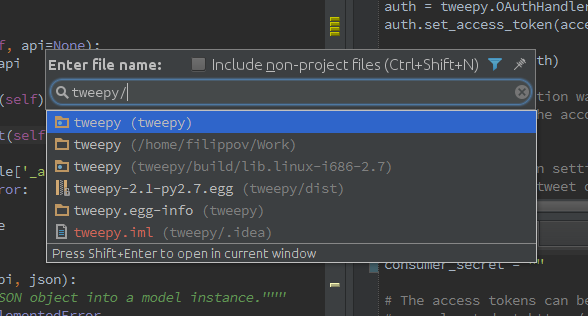
The graphically displayed log for Git and Mercurial is now shown faster, it is more convenient to use it: the display of brunches has become more compact, it has become easier to work with several repositories in one project.
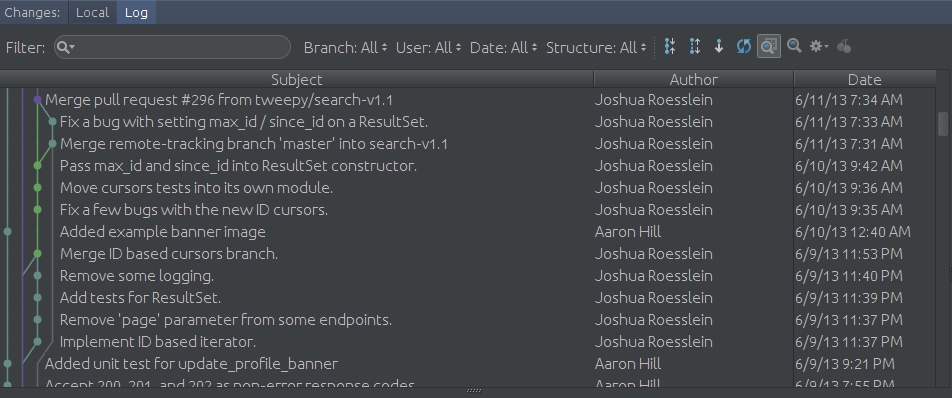
In addition, they added support for Subversion 1.8 (using a native client).
On our site you can see what's new in PyCharm 3.1, and download the latest version for your platform.
We discussed the difference between Community Edition and Professional Edition in the announcement of PyCharm 3.0 , the latest comparison table is always on our website.
PyCharm 3.1 Professional Edition update is free for anyone who bought a license after February 4, 2013. As before, a 30-day free full-featured trial version is available to everyone.
Program with pleasure!
PyCharm command
Download PyCharm 3.1 right now (and keep reading until it loads).
New PyCharm 3.1 now supports the latest versions of Python 3.4 and Django 1.6. We did not ignore the support of Google App Engine - it has been noticeably improved. PyCharm 3.1 also integrates improvements made recently in a common platform for all our IDEs - IntelliJ.
')
What's new?
Python 3.4 supported

PyCharm 3.1 supports Python 3.4, including new standard libraries and the latest language innovations. You can safely switch to a new interpreter and work while enjoying new Python features.
Supported by Django 1.6

In PyCharm 3.1, there are no more problems that could have previously arisen when working with the new version of Django, so now you can safely update both PyCharm and Django!
Simplify Google App Engine
The details on how to create and upload your application on Google App Engine are shown in a screencast of John Lindquist:
Among the innovations worth noting: in PyCharm 3.1, the project launch configuration settings for the Google App Engine and Django project types are unified, and the Google App Engine integration itself now works perfectly with username and password authentication. In addition, we added several inspections, thanks to which code analysis and auto-completion were improved.
What are other news?
- Vagrant support has been expanded, the choice of provider (VirtualBox, VMware or other) and the plug-in manager are now included in the updated support.
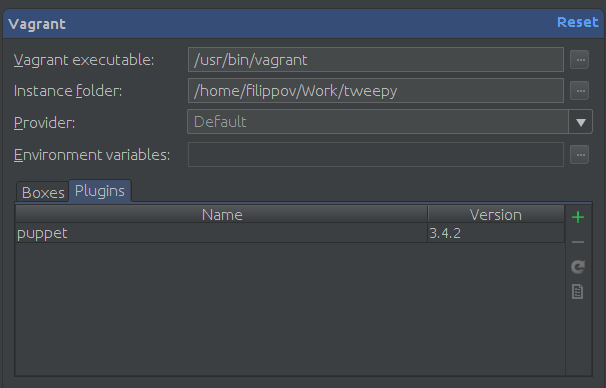
- The terminal built into the IDE received full-fledged tabs that can now be dragged, learned to support window splitting and other useful trivia.
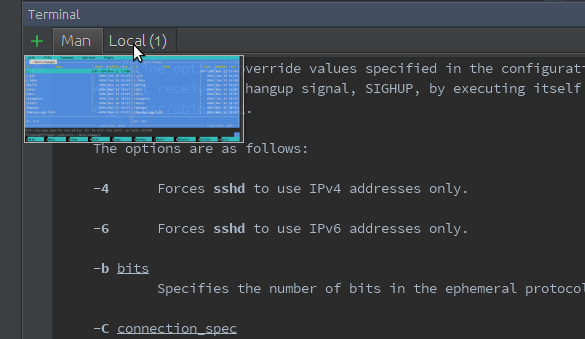
- it became more convenient to insert fragments in SQL into the code in Python (language injections). How to do this, get all the benefits of autocompletion and immediately see the result, says another screencast from John Lindquist (in English):
General improvements
- The process of creating skeletons (metadata for static code analysis) is now made background, and the modal window will not prevent you from writing code immediately after adding a new interpreter. However, until this background process is completed, errors in the code will not be underlined, and auto-completion will temporarily not work.
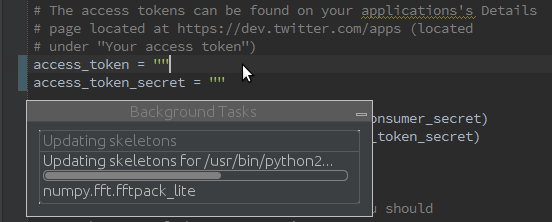
- PyCharm now finds the Python interpreter itself and does not complain about every line in the code if the interpreter is not set in the project properties. So now you can start writing code without delay and customizing.
And what about performance?
After the release of PyCharm 3.0, we are closely engaged in improving performance and optimizing the new version. In version 3.1, we accelerated editing of large .po files, as well as indexing and searching for heavy binary modules like PyGTK and PyQT. We expect that in the next release we will accelerate even more features. Stay tuned!
Improvements in the new platform
Since PyCharm 3.1 is based on the latest version of the InelliJ platform, it incorporates all the latest improvements to the platform, for example:
New interface
By default, PyCharm hides the toolbars, leaving only the menu and editor (it is easy to put them in place - View | Toolbar and View | Tool Buttons). The toolbar can also be seen by clicking the special small icon in the lower left corner of the screen).

Magnifier mode
When you hover on the error highlighting, warning, or selecting a region on the scroll bar, a pop-up window appears with the corresponding code fragment, as well as the warning itself or an error message.

Search everywhere
You use convenient navigation with the help of Go to Declaration, Navigate to Class / File / Symbol, Find Action functions? Now everything is even better - you can search and navigate everywhere even faster, and even uniformly.
A quick double-click Shift calls up the new Search Everywhere function, allowing you to quickly find a class, file, action, or even an IDE setting.

High-speed file navigation
Now it is even easier to search for files and directories in the project: in the window with the project tree just type a substring and the corresponding names will be highlighted.

Jump to directory
To go to the directory, you can use the same mechanism as to go to the file: Navigate to File.

One more thing in search and navigation
- Search and navigation (Find Usages and Navigate to Actions) have become faster, and the editor is more responsive during background indexing. Often used characters in Find Usages results are displayed faster than before.
- Added search options for the entire project (Find in Path) in the comments and string literals (just tick in which parts of the code to search for text).
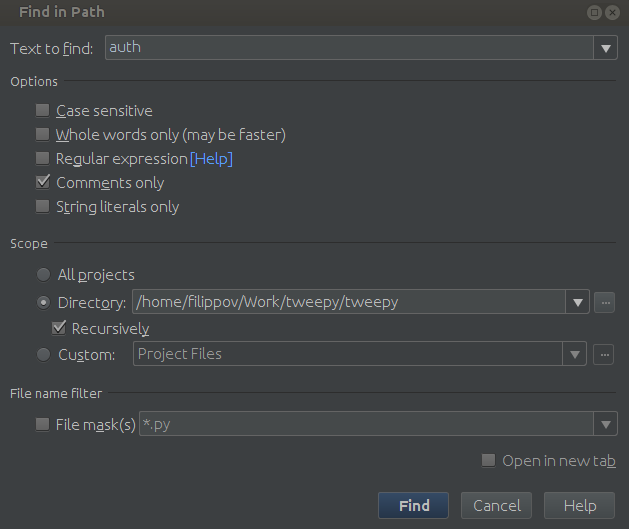
Version Control Systems
The graphically displayed log for Git and Mercurial is now shown faster, it is more convenient to use it: the display of brunches has become more compact, it has become easier to work with several repositories in one project.

In addition, they added support for Subversion 1.8 (using a native client).
And...
- Improved support for SQL dialects and added new features to the database toolkit (Database Tool - we hope that you already used it),
- Retin support appeared in JDK 7 ( details are in English),
- and much more (see IntelliJ IDEA 13 what's new page in English or our post about IntelliJ IDEA 13 on Habré ).
On our site you can see what's new in PyCharm 3.1, and download the latest version for your platform.
We discussed the difference between Community Edition and Professional Edition in the announcement of PyCharm 3.0 , the latest comparison table is always on our website.
PyCharm 3.1 Professional Edition update is free for anyone who bought a license after February 4, 2013. As before, a 30-day free full-featured trial version is available to everyone.
Program with pleasure!
PyCharm command
Source: https://habr.com/ru/post/211338/
All Articles